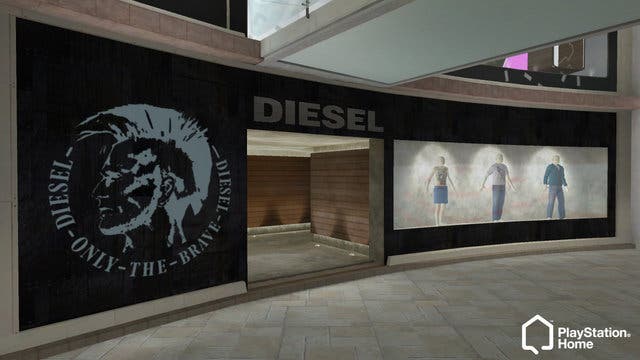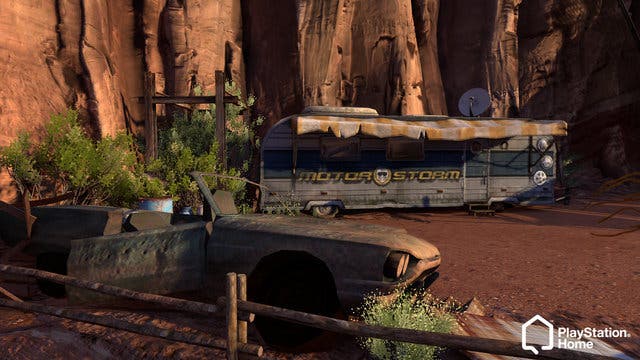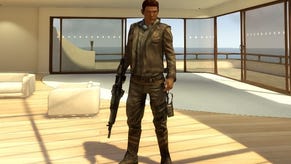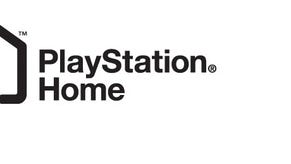PlayStation Home
Where the heart is?
Sony's also seeking revenue from the sale of virtual items and accessories. A piece of clothing will set you back 59 pence, while an object of furniture costs 79 pence (walking into shops in the mall takes you straight to custom PlayStation Store pages).
We're really not convinced Sony's micro-transaction drive is going to work. Home's muted, realistic visual style - although it's certainly easy on the eye, with warm soft-focus lighting offsetting all those clean modernist lines - counts against it here. The cartoonish exuberance that compels people to spend money in MapleStory, PangYa and the like on rabbit ears or pet dragons can't be applied to this lifestyle utopia. The result is you're faced with spending a Euro on a new neckline or a Scandinavian light-fitting in a cheap simulacrum of real-life retail therapy. Where's the escapist reward - or to put it bluntly, the fun - in that?
All it means in the long run is that, with the default wardrobe items severely restricted in order to encourage item sales (not that the clothes available to buy were all that different in style), everyone's going to look the same. The avatar creator is partly at fault here, too.
In fact, it's quite powerful and flexible, and with some work you can achieve remarkably convincing results. But rather than opt for the Mr. Potato Head-style pick-and-mix of features approach, Home requires you to patiently sculpt your face and frame by tweaking the parameters on a number of preset (and not very appealing) archetypes. Most people understandably don't have the patience; it's so much easier, not to mention more fun, to capture someone's essence with the plug-and-play cartoons of Miis or Xbox Avatars.
A problem with assessing Home at the moment is that, in its current beta state, its defining feature - how it feeds into and connects with PlayStation gaming as a whole - is missing. Even the themed showrooms for Sony games like Resistance - showrooms that will, Sony hopes, convince other publishers to buy floor space in Home - aren't in yet, although they're expected soon. You can't display trophies yet (it's even rather slow to retrieve trophy information from player profiles). Game-launching integration is far from complete.

You're left with Home's own distractions. There's the bowling alley, where you can play very basic and frustrating games of pool and bowling, if you can be bothered to queue for a slot (these really should have been instanced), or simple Flash-style arcade games. The theatre, where you can watch movie and game trailers (not in full-screen) is cumbersome but as a 3D, browsable advertising hoarding, it does work. The shopping centre allows you to buy clothes and furniture or even a new "personal space" (house or flat) for GBP 3.99. Home Square connects them all, and offers a simple but pleasant chance to sit in the sun and play draughts.
It's not a seamless world by any means, but the areas load quickly after an initial download and, sensibly, you can teleport between them, or to a friend's location, at any point. Given how much utility there is in Home (even if there isn't much to do with it at present), the start-button interface is clean, clear and fast and has all the options you could want instantly available. To some extent, this makes up for communication and physical navigation being slow and unwieldy.
Home was never meant to be judged in a bubble, but unfortunately, that's how it is right now. In isolation, it doesn't have a lot of content - but, again, this is a beta, and like any virtual world it will grow organically over time. We're not going to criticise it for being small, or for not being fully plugged in to the rest of PlayStation's world yet.

But - although it's stable and polished enough - Home shows Sony up to be the amateur entrant in virtual worlds that it is. A little consultation from MMO arm Sony Online Entertainment could surely have avoided some of the many simple pitfalls Home tumbles into. There's the lack of basic customer services like an indication of if and when servers are up, for example, or the constricted communication, or the frankly absurd monetisation of socialising.
Then there's the stiff, airless lack of character to it. You can tell Home is the sort of place where pressing Select brings up a "Go to Personal Space" option. It's as glossy, whitewashed and empty as an episode of Laguna Beach, a non-place where non-people have non-conversations. In its anxiousness to offend no one, Sony has made Home appealing to no one. Until it connects with the outside world it's a just a very expensive snow-globe. Home is a nice enough place to visit, but right now, you wouldn't want to live there.








